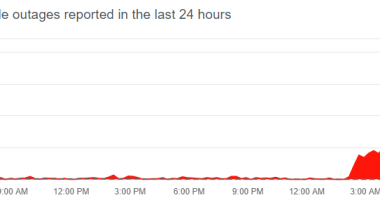JENNA Dowsdell, 35, looked on in horror at her front door, paralysed with fear, after a sudden loud banging woke her early one morning.
Within seconds, someone was twisting the handle with such strength the plaster around the doorway was falling off.
Barely able to control her shaking Jenna, who had moved into the four-bedroom house just a few days earlier, peeked out the window.
According to single Jenna, a carer from Llandaff North, Cardiff there were two big, burly men dressed all in black bashing on her front door.
“They looked like thugs or burglars. I was terrified,” she told The Sun.
“I had no idea what they wanted. It was like I was in a horror movie.
Read more on debt
“Then to my horror the men sprinted around the side of my newly rented house and jumped the fence. I thought I was under attack.
“The men were twice my size and started shoving the back door. The banging was so loud and strong, pots and pans in the kitchen were falling off the shelves.
“I was so terrified I ran and hid in the bedroom, pushing the door shut and barricading myself in. I had no idea what was going on. I was shaking and crying. I thought I was going to be murdered.”
After 30 minutes the two men left but Jenna was left shaking for hours after.
Most read in Money
Little did she know that the pair were actually bailiffs.
While they can force entry to your home if they’re collecting certain types of debt, including magistrates court fines, income tax or stamp duty, for other kinds of debt – including utility bills – bailiffs can’t force their way in.
Even when they are allowed, they must follow certain rules, like showing proof of what you owe and a “warrant” or a “writ” from a court.
They aren’t allowed to batter the door down.
“I was shivering in fear. My heart was racing. I was having hot and cold flushes and I couldn’t breathe. That was how much terror I felt.
“I was reduced to cowering behind my bed in a dressing gown not knowing my rights, feeling like I was about to be attacked or killed.” she says.
“I didn’t want to call the police because I knew they’d take forever to come and by then the men would be gone.
“My mind was racing. When you’re faced with terror of that level your brain shuts down and a fight or flee response kicks in.”
I was unable to cope with the stress
Jemma Dowsdell
Shortly after, Jenna discovered she had no hot water for a bath – she had been cut off.
“I’d moved in in November 2013 and followed the estate agent’s guide to setting up the new accounts for the gas, electric, council tax, internet and water.
“The home’s boiler had been working when I moved in. At first I thought the boiler just needed to be reset.”
Having just moved in, Jenna was being chased for someone else’s debts and that knock on the door was the start of six years of a bailiff and debt chasing horror.
A debt of £1,167 was related to previous tenants. “I had no idea and there was no forwarding address for them,” she said.
“The gas meter had been taken leaving me with no access to hot water, heating or gas for my stove. It was December and freezing.”
According to Jenna, the bailiffs left no letters or cards explaining they’d visited or what they had done.
When Jenna moved in a week earlier, the estate agent had told her Swalec supplied the property.
“I set up my direct debits with Swalec.
“I rang Swalec and they said they were providing gas to my four-bedroom house and the flat upstairs. I rang British Gas who then claimed they provided my gas.
“Both companies were adamant they provided the gas. I’d only been in the property for less than a month and I explained the bills belonged to previous tenants.”
Jenna then rang both providers with proof she didn’t owe the debt left by the previous tenants.
“I sent them my lease, confirmations from the estate agent, my council tax information and move in date.
“I spent Christmas with no heating and gas. I couldn’t even cook the Christmas turkey.
Almost five weeks after bailiffs removed her gas meter Jenna was told she could have access to a pay as you go meter at the property.
“I was shocked. It wasn’t my debt. I felt like I was being penalised for the previous tenants debts,” she said.
When providers can install prepayment meters
A prepayment meter can be installed by suppliers when people fall behind with bills, usually as a last resort.
Instead of using energy and being billed for it later on, customers must cover their usage upfront.
This is usually with a “pay as you go” (PAYG) card that can be topped up with credit at local shops and Post Offices, or can be done via an app if it is a smart prepayment meter.
When Jenna was moved on to a prepayment she was shocked to find that each time she topped up, some of the money was taken to pay off the debt, even though it wasn’t hers.
“British Gas sent the prepayment card out. But Swalec kept sending me bills for my property too.
“Both companies were adamant they provided the services I was using. I had no way of knowing how to disprove them.
“I put £40 on my card one day. I topped up the meter and it was immediately taken. I was stunned. With this PAYG meter I felt like I had no way of proving I’d topped it up.”
Disputing the debt again with British Gas, she was asked to provide more evidence.
Jenna then started receiving letters from both gas companies claiming they each supplied the property.
“The house I rented was constantly being confused with a smaller property considered to be a flat upstairs,” she said.
“Swalec kept chasing me claiming they were the provider. It was a nightmare because I lived in fear of more bailiff visits.
“I spent hundreds of hours trying to get help. I have lived in fear of bailiffs returning. I didn’t know my rights when bailiffs first tried to gain access to my new home.
“This has been a horrific experience. I am still trading letters with the gas companies refusing to back down.
Jenna has paid over £2,000 for gas, essentially paying twice, but “no one will listen”.
She sought help from Citizens Advice about what she should do.
“They recommended writing clear letters to both gas companies and asking them for backup data.
“I wrote a number of letters to British Gas and Swalec asking them for documentation which proved they were supplying gas to me.
“They both insisted they supplied me. I was constantly being threatened with debt collection agencies. It forced me in the end to move house.
“I was unable to cope with the stress. Even when I moved I got a bill saying I still owed more money.
“It was just me living in the property with my dogs.
“I rang up and explained I’d moved. After a long conversation and more correspondence that remaining debt was wiped.”
Jenna is now writing to the Energy Ombudsman in an attempt to get her money back and to raise awareness about issues tenants experience with bailiffs and confusion over which gas company supplies a property.
“This has gone on for a decade. I don’t want other people to experience it. The bailiff visit disempowered me. Now I want answers.”
British Gas told The Sun it would look into Jenna’s case.
A spokesperson encouraged any British Gas user experiencing concerns over bills to contact them so an open line of communication can begin.
The Sun also contacted Swalec for comment.
All energy suppliers now follow OFGEM’s new PAYG meter installation guidelines issued in 2023 which say: “Suppliers must install prepayment meters without a household’s permission in a fair and responsible way, and that they should only be used as a last resort.”
Last year, Ofgem asked that installing prepayment meters without a household’s permission for paying back debt be paused.
This was due to concerns about the behaviour of suppliers installing them in households.
There are new rules that have been moved into the standard gas and electricity licences. All energy suppliers have to follow them.
“It’s been a living hell” Jenna says, and lives in fear of people knocking on her door again.
“I have nightmares about bailiffs and it wasn’t my fault. I feel like I am stuck in a bizarre web of debt demands. It’s been over six years.”
Jenna’s experience is not an isolated one.
Simon Trevethick, from debt advice charity StepChange, previously told The Sun: “We regularly receive reports of bailiffs misrepresenting their powers, using aggressive and intimidating tactics, and treating vulnerable people unfairly.”
In March Citizens Advice reported more than two million people have been contacted by bailiffs during the cost of living crisis, with a majority of those who came into contact with a debt collector reporting they felt harassed or intimidated.
The charity estimates that bailiffs added £250million in fees to people’s debts in the past 18 months, driving people deeper into financial hardship.
According to the charity more than a third of people who came into contact with a bailiff were subjected to behaviour that broke Ministry of Justice rules.
These included bailiffs forcing their way into homes, not taking into account vulnerabilities such as disability or illness, or taking goods needed for work reasons.
Your rights if bailiffs knock on your door
Debt Advice charity StepChange says more and more families and people are being threatened with bailiffs since the cost of living crisis.
It’s important to know your rights and to seek help immediately if you find yourself battling debt or are threatened by bailiff action.
If you get a knock at the door from someone who says they are a bailiff or an enforcement agent, ask for proof and why they’re visiting — but lock the doors first, as they are allowed to enter through unlocked doors.
Agents can knock and ask to enter, but some lodge their foot in the door so they can push their way in.
Legitimate bailiffs should carry identification issued by the court or enforcement agency.
This ID typically includes a photograph, name and details about the court or agency they represent. You should always ask to see this identification and verify it before allowing anyone into your home.
The most common type of bailiff is a Certificated Enforcement Agent.
Bailiffs can force entry to your home if they’re collecting certain types of debt, including magistrates court fines, income tax or stamp duty.
They aren’t allowed to batter the door down.
If they try to force their way in, they will bring a locksmith with them although this is rare.
Bailiffs need to show you proof of what you owe and a “warrant” or a “writ” from a court.
These documents must be signed, in date and have your correct name and address shown on them.
For other kinds of debt, such as unpaid council tax, credit card or catalogue balances, parking tickets or utility bills, bailiffs can’t force their way in.
If you are disabled, seriously ill, have mental health problems, are pregnant, a pensioner or parent to small children, there are extra protections in place.
Once you’ve checked the bailiffs’ ID, ask for a full breakdown of the debt they’re collecting and who it’s owed to.
You’re not liable for someone else’s debt, even if it belongs to your adult child or partner.
If it’s your debt, tell the bailiff to leave and say you’ll speak to a debt charity, and to your creditor to make arrangements to pay.
If Bailiffs refuse to tell you who they are or show identity cards, then dial, 999.
If you’re worried about a debt, talk to the company you owe the money to. Remember the sooner you raise a worry the less chance you will incur penalties and court costs if bailiffs are instructed.
Try to enter into a payment plan to pay off the debt. Asking for help is the most important thing you can do because the company you owe money to can then better understand your situation
READ MORE SUN STORIES
You can seek help from the Citizens Advice Bureau or StepChange.
Remember you are not alone. There are charities and as well as government assistance available to help people and families dealing with rising debt.











